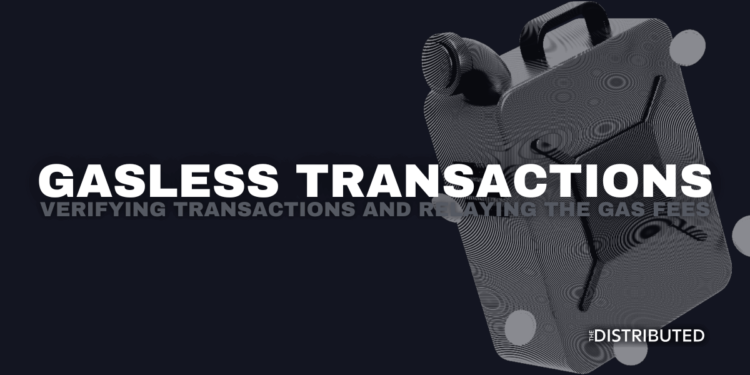What Are Gasless Transactions?
Gasless transactions, also known as meta-transactions[1]OpenZeppelin – Sending Gasless Transactions, are a way for users to send tokens without the associated gas fees.
Gasless transactions are meant to make decentralized applications (dApps) more accessible, as gas fees often drum out potential users due to their added costs over the initial price. Having to keep extra crypto in your wallet to interact with the dApp’s services gets tricky, especially for new users.
How Do Gasless Transactions Work?
Data associated with gasless transactions is created by the user wanting to send the funds, but it’s sent to a third-party (relayer) who confirms the transaction – paying the gas. The use of a base contract preserves the identity of the original user.[2]OpenZeppelin – Sending Gasless Transactions
This still costs money, gas is paid by charging a contract called the paymaster.[3]Gas Station Network – Paying for Your User’s Meta-Transaction Relayers will pay for the gas, but are reimbursed by the paymaster with an added fee for their services.[4]The GSN Protocol – Definitions
The owner of the paymaster is responsible for maintaining a sufficient balance within its contract.[5]The GSN Protocol – Implementing A Paymaster Every paymaster operates differently, and is funded through various methods such as accepting transactions on behalf of paying dApp subscribers,[6]Gas Station Network – Who Pays For Gas? dApps refunding the relayer, or paying for gas fees externally (via credit cards, PayPal, any other cryptocurrency) to ease the complication of storing enough crypto to pay for the fees.
Biconomy and the Gas Station Network (GSN) are the two most prominent relayer protocols at the moment.
What Is Gasless Minting?
Gasless minting is a transaction fee option for minting non-fungible tokens (NFTs). Minting is a term derived from bringing new money into circulation, similarly minting an NFT brings it into the blockchain economy. Minting turns a standard JPEG or PNG into an NFT. Gasless minting makes selling NFT more accessible for artists and everyday users.
Minting an NFT is done through a smart contract and is considered a transaction. Therefore, it requires gas fees to pay the validators or miners for their computational power used to confirm the transaction. Gasless minting uses meta transactions to mint NFTs without users paying to do so.
Is A Completely Gasless Blockchain Possible?
A completely gasless blockchain is not possible as transactions must be verified by a decentralized network rather than a centralized one. This means nodes scattered around the world have to verify transactions – which takes time and energy. As energy isn’t free, neither is confirming transactions, fees also incentivize users to keep the blockchain running.
Although there are blockchains that have fees so minuscule that you will never notice them such as Stellar Lumen (~$0.0000035/transaction) and Litecoin (~$0.007/transaction).
References



